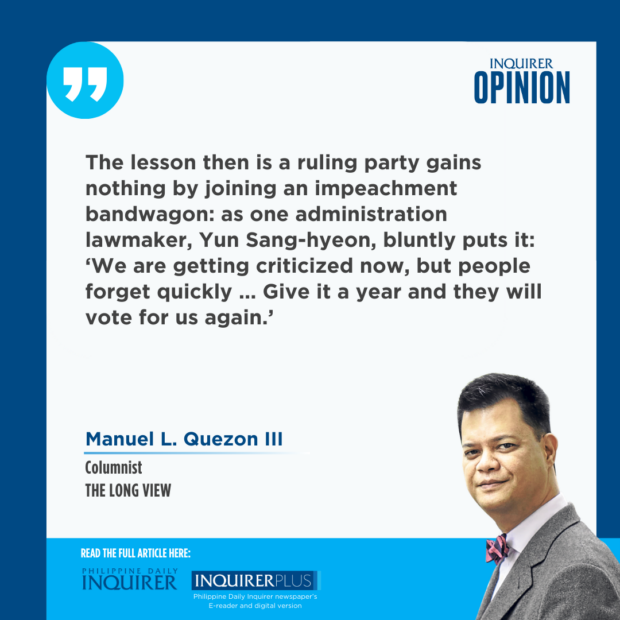
South Korea is a very neat and clean country, but in public spaces, trash cans are few and far between. Soon after our arrival in 2023, when I noticed this, I was told why: it’s a holdover from the pro-democracy riots of the 1980s, when students would hurl trash cans at the police.
There is an undercurrent of toughness, even confrontation, in the politics of the Republic of Korea. Our introduction to this came by way of the Korean medical system when, in February last year, the government announced it would increase the number of slots for admission to medical schools. The medical profession erupted in outrage, residents and interns walked out, and even as professors had to scramble to fill in the gap, the profession as a whole supported the strike. The government reacted with increasing fury, at one point threatening to draft the striking residents and interns into the army to force them to go back to their posts. Public opinion was vehemently opposed to the strike, which was perceived to be merely in support of maintaining the wealth and status of doctors, in a society that has one of the lowest doctor-per-capita ratios in the developed world.
The strike continues to this day; in the hospital, our family visits, oncology has ceased admitting new patients, and waiting times for many services are long. What this suggested to me was that public opinion can be ignored, even flouted, by a committed, even selfish, minority, when the stakes are high enough—and the institutions, even when supported by public opinion, can be thwarted as a result.
For all his protestations to the contrary—it was symbolic, he said—President Yoon Suk-yeol of South Korea was serious about martial law. But he, as he himself claimed in his speech announcing his surprise move, felt his back was to the wall because his Cabinet kept being impeached, his budget was being slashed, his wife was facing perpetual investigations, so that he felt incapable of governing: not least, though he didn’t mention it, because his party had lost the midterms, reducing him to the status of a lame duck president. Observers would later point out that part of the reason the confrontation between the President and the opposition was so ferocious is that the leader of the opposition himself faces multiple investigations and that a snap presidential election would enable that leader, Lee Jae-myung, to avoid electoral disqualification.
The problem (for Yoon, as it turned out) was he was up against a society and even a political system allergic to the idea of emergency rule. Our Supreme Court likes to quote the old maxim that “when the guns speak, the law falls silent,” and any martial law worthy of the name requires not just meticulous planning, but ruthless execution by an emboldened military.
Two stories best illustrate the military response to being ordered to shut down the legislature and lock up lawmakers, take over the media, and pursue a conspiracy theory alleging the opposition rigged the midterms that the ruling party lost. The special forces supposed to chopper into the National Assembly were delayed 40 minutes because they had to wait for permission to enter a no-fly zone because the Air Force didn’t know martial law was going on. The delay party explains how assemblymen got the chance to hold an emergency session that voted down martial law; soldiers sent to raid the National Election Commission “all took a long walk or had instant ramen at convenience stores, then sauntered back after martial law was lifted.”
A British news report put it best: martial law, it said, lasted half an hour longer than the film “Parasite.” Having not only failed, but spectacularly so, it seemed impossible for President Yoon to avoid impeachment. But he did, for reasons similar to the success of the Korean doctors: stubborn discipline born of self-interest.
The Korean Constitution requires a two-thirds majority or 200 out of 300 assemblymen, to impeach. The President’s party, though diminished, retains 108 seats–eight more than is needed to deny the passage of an impeachment motion. If party disciple would hold, then impeachment would fail—over and over. On the day of the impeachment vote, he dangled an offer his party couldn’t refuse: he would, he said, recede from governance and share it with his party. But he would remain in office.
Galeazzo Ciano, Benito Mussolini’s son-in-law and foreign minister, famously observed, “Victory has a hundred fathers but defeat is an orphan.” For the President’s party, the last time impeachment happened, the then ruling party helped throw their leader overboard—and themselves got massacred in the next election. The lesson then is a ruling party gains nothing by joining an impeachment bandwagon: as one administration lawmaker, Yun Sang-hyeon bluntly puts it: “We are getting criticized now, but people forget quickly. We saw it after the Park Geun-hye impeachment. Give it a year and they will vote for us again.” They would deny the opposition a victory, and still manage to hold on to power. But Yoon would have to go.
(To be continued)
—————-
Email: mlquezon3@gmail.com; Twitter: @mlq3